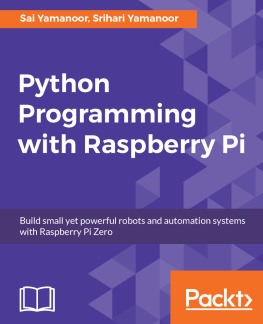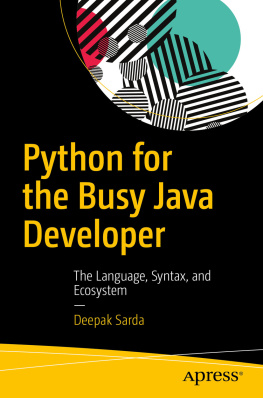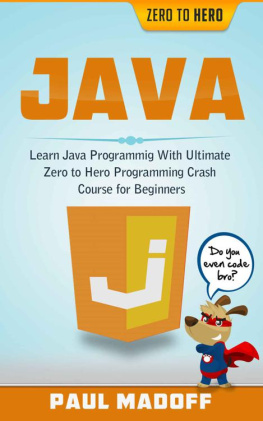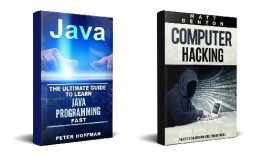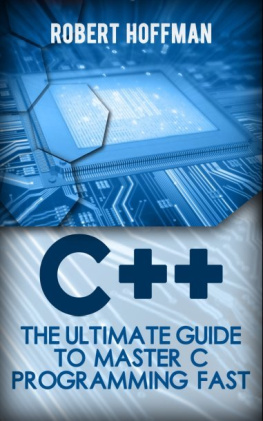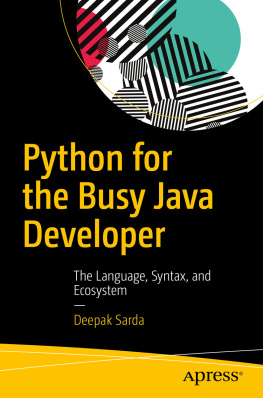Swift - Java Programming: Python Programming: Master Programming Guide: Learn In A Day Series (Python, Java, SQL, PHP, HTML, Ruby)
Here you can read online Swift - Java Programming: Python Programming: Master Programming Guide: Learn In A Day Series (Python, Java, SQL, PHP, HTML, Ruby) full text of the book (entire story) in english for free. Download pdf and epub, get meaning, cover and reviews about this ebook. year: 2016, genre: Computer. Description of the work, (preface) as well as reviews are available. Best literature library LitArk.com created for fans of good reading and offers a wide selection of genres:
Romance novel
Science fiction
Adventure
Detective
Science
History
Home and family
Prose
Art
Politics
Computer
Non-fiction
Religion
Business
Children
Humor
Choose a favorite category and find really read worthwhile books. Enjoy immersion in the world of imagination, feel the emotions of the characters or learn something new for yourself, make an fascinating discovery.

Java Programming: Python Programming: Master Programming Guide: Learn In A Day Series (Python, Java, SQL, PHP, HTML, Ruby): summary, description and annotation
We offer to read an annotation, description, summary or preface (depends on what the author of the book "Java Programming: Python Programming: Master Programming Guide: Learn In A Day Series (Python, Java, SQL, PHP, HTML, Ruby)" wrote himself). If you haven't found the necessary information about the book — write in the comments, we will try to find it.
Java Programming: Python Programming: Master Programming Guide: Learn In A Day Series (Python, Java, SQL, PHP, HTML, Ruby) — read online for free the complete book (whole text) full work
Below is the text of the book, divided by pages. System saving the place of the last page read, allows you to conveniently read the book "Java Programming: Python Programming: Master Programming Guide: Learn In A Day Series (Python, Java, SQL, PHP, HTML, Ruby)" online for free, without having to search again every time where you left off. Put a bookmark, and you can go to the page where you finished reading at any time.
Font size:
Interval:
Bookmark:
Respective authors own all copyrights not held by the publisher. Legal Notice: This book is copyright protected. This is only for personal use. You cannot amend, distribute, sell, use, quote or paraphrase any part or the content within this book without the consent of the author or copyright owner. Legal action will be pursued if this is breached. Disclaimer Notice: Please note the information contained within this document is for educational and entertainment purposes only.
Every attempt has been made to provide accurate, up to date and reliable complete information. No warranties of any kind are expressed or implied. Readers acknowledge that the author is not engaging in the rendering of legal, financial, medical or professional advice. By reading this document, the reader agrees that under no circumstances are we responsible for any losses, direct or indirect, which are incurred as a result of the use of information contained within this document, including, but not limited to, errors, omissions, or inaccuracies. Sign up for FREE computer training and ebooks! http://freecomputertraining.strikingly.com
Though code written in C or C++, the powerful predecessors of Java could also run on all devices, the effort required to compile them each time to make it work on specific devices was very expensive. Java overcame this by simply taking the text source code(.java) and compiling it to an intermediate byte code (.class) file, which can then be interpreted by any device running an interpreter - Java Virtual machine (JVM). The idea of byte code meant the code became architecture neutral, needs to be compiled only once and can be interpreted on any device which can run a JVM on it. Today, Java has grown into an important programming language and it is become almost imperative for anyone interested in programming to know at least the basics of Java. This book has been written exactly for this purpose.
Beginners can use online development environment ( https://ideone.com/ ) to execute small snippets of code, but if the code to be executed is a full-fledged program, then one must install java to their system and setup their own offline development environment. Java comes in three types
- The Micro Edition (J2ME)
- Standard Edition (J2SE)
- Enterprise Edition (J2EE)
 Every java code is saved with the extension .java. Each java program contains one or more classes.
Every java code is saved with the extension .java. Each java program contains one or more classes. Each of these classes contains one or more method definitions and each method carries a few statements in it.
Since main() is the driver function, it should always be public. Static : You need to keep in mind that main() method should always be static because it makes the program memory efficient. Void : This is the return type of the method. This means that the main() method will not return anything. Main : name of the method. The interpreter starts execution from the main() method only.
Running a program means instructing the JVM to load the .class file which was compiled from the source code and start executing from the main() method. The two uses of the main method can be summarized as:
- To Test all the other methods of the program
- To Start execution of the program.
The other statement within the main() method in our program is called a comment statement. These are not compiled, the purpose of these statements which are preceded by // are only to give the programmer more information about code. Java doesnt have the concept of global variables at all, the same is achieved using keywords such as fina;, static, public.
Font size:
Interval:
Bookmark:
Similar books «Java Programming: Python Programming: Master Programming Guide: Learn In A Day Series (Python, Java, SQL, PHP, HTML, Ruby)»
Look at similar books to Java Programming: Python Programming: Master Programming Guide: Learn In A Day Series (Python, Java, SQL, PHP, HTML, Ruby). We have selected literature similar in name and meaning in the hope of providing readers with more options to find new, interesting, not yet read works.
Discussion, reviews of the book Java Programming: Python Programming: Master Programming Guide: Learn In A Day Series (Python, Java, SQL, PHP, HTML, Ruby) and just readers' own opinions. Leave your comments, write what you think about the work, its meaning or the main characters. Specify what exactly you liked and what you didn't like, and why you think so.




